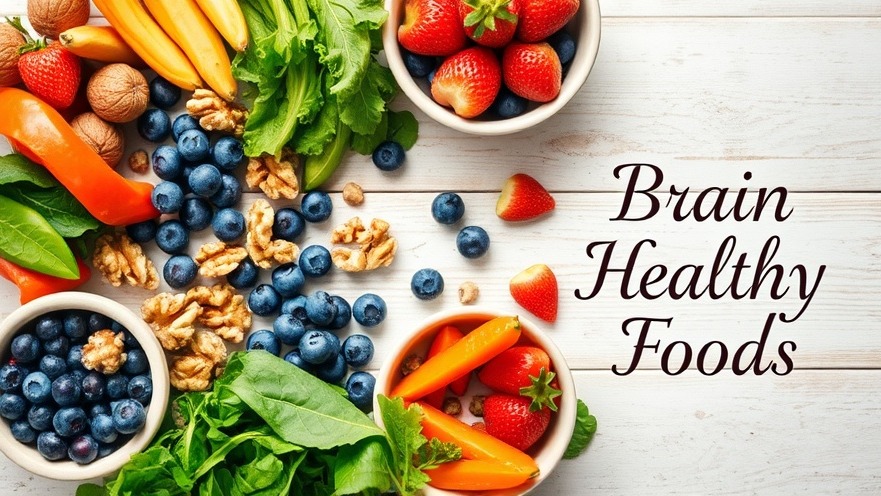
Nourishing Your Neurons: A Neurologist's Guide to Brain-Healthy Foods
Introduction
The brain is arguably our most complex organ, requiring a delicate balance of nutrients to function optimally. As a neurologist who has spent years studying the intricate relationship between nutrition and brain health, I've observed firsthand how dietary choices can impact cognitive function, mood regulation, and even long-term neurological health. This article outlines evidence-based food recommendations that support brain health across the lifespan, from development to healthy aging.
The Neurological Basis of Nutrition and Brain Health
Before diving into specific food recommendations, it's important to understand why nutrition matters for your brain. Your brain:
Consumes about 20% of your body's energy despite representing only 2% of your body weight
Requires specific fatty acids for myelin development and maintenance
Depends on antioxidants to combat oxidative stress and inflammation
Utilizes various vitamins and minerals as cofactors in neurotransmitter production
Relies on proper glucose regulation for consistent energy supply
The foods we eat provide the raw materials for these essential processes. Let's explore the best options for optimal brain function.
Top Brain-Nourishing Foods
1. Fatty Fish: The Omega-3 Powerhouses
Fatty fish like salmon, mackerel, sardines, and trout are exceptional brain foods due to their high concentration of omega-3 fatty acids, particularly DHA (docosahexaenoic acid).
Neurological benefits:
DHA comprises approximately 40% of the polyunsaturated fatty acids in your brain
Essential for neuron membrane fluidity and function
Supports myelination—the process that insulates nerve fibers for efficient signal transmission
Anti-inflammatory properties that may help prevent neurodegenerative processes
Associated with improved cognitive performance and reduced risk of dementia
Recommended intake: At least 2 servings (8 oz total) of fatty fish weekly
2. Berries: Nature's Neuroprotectors
Blueberries, strawberries, blackberries, and other deeply pigmented berries contain powerful polyphenols called anthocyanins and other flavonoids.
Neurological benefits:
Cross the blood-brain barrier to directly influence brain cells
Potent antioxidant and anti-inflammatory properties
May enhance neuroplasticity—the brain's ability to form new neural connections
Associated with delayed cognitive aging by up to 2.5 years according to longitudinal studies
May improve signaling in brain centers associated with memory and learning
Recommended intake: 1/2 cup of mixed berries daily
3. Leafy Greens: Folate and Lutein Sources
Spinach, kale, collard greens, arugula, and other dark leafy vegetables provide essential micronutrients for brain health.
Neurological benefits:
Rich in folate, which is crucial for neurotransmitter production and DNA methylation
Contain lutein and zeaxanthin that accumulate in brain tissue, particularly in areas associated with memory
Provide vitamin K, which is involved in sphingolipid metabolism (important for brain cell structure)
Offer magnesium, which modulates NMDA receptors involved in learning and memory
Higher consumption correlates with slower cognitive decline in aging adults
Recommended intake: At least 1 cup (raw) or 1/2 cup (cooked) daily
4. Nuts and Seeds: Brain-Boosting Packages
Walnuts, almonds, flaxseeds, and chia seeds provide an excellent combination of healthy fats, protein, and micronutrients.
Neurological benefits:
Walnuts particularly resemble the structure of the brain and contain neuroprotective compounds including omega-3s, polyphenols, and melatonin
Vitamin E content helps protect neuronal membranes from oxidative damage
Zinc and magnesium support neurotransmitter function and synaptic plasticity
Regular nut consumption is associated with better cognitive function in older adults
Provide ALA (alpha-linolenic acid), a plant-based omega-3 that supports brain health
Recommended intake: 1-2 ounces (small handful) daily
5. Whole Grains: Sustained Brain Energy
Brown rice, quinoa, oats, barley, and other whole grains provide complex carbohydrates that fuel brain function.
Neurological benefits:
Release glucose slowly into the bloodstream, providing steady energy to the brain
Contain B vitamins essential for neurotransmitter synthesis and energy metabolism
Provide vitamin E with neuroprotective properties
Rich in fiber that supports gut microbiome diversity, which influences brain health via the gut-brain axis
Associated with reduced risk of cognitive decline compared to refined carbohydrates
Recommended intake: 2-3 servings daily (1 serving = 1/2 cup cooked grains)
6. Fermented Foods: Gut-Brain Axis Support
Yogurt, kefir, sauerkraut, kimchi, and other fermented foods enhance gut microbiome diversity.
Neurological benefits:
Support the gut-brain axis communication network
May influence neurotransmitter production, as many neurotransmitters are produced in the gut
Help reduce systemic inflammation that can affect brain function
Emerging research suggests beneficial effects on stress response and mood regulation
May help maintain blood-brain barrier integrity
Recommended intake: 1-2 servings daily
7. Olive Oil: Mediterranean Brain Protection
Extra virgin olive oil serves as a cornerstone of the Mediterranean diet, consistently associated with brain health.
Neurological benefits:
Rich in monounsaturated fats that support healthy blood flow to the brain
Contains oleocanthal with anti-inflammatory properties similar to ibuprofen
Provides polyphenols that may help prevent beta-amyloid plaque formation associated with Alzheimer's disease
Associated with preserved memory and learning ability in aging
Supports overall cardiovascular health, which directly impacts brain function
Recommended intake: 1-2 tablespoons daily as primary cooking oil or in dressings
8. Dark Chocolate: Cognitive Enhancer
High-cocoa content chocolate (70%+ cocoa) offers legitimate brain benefits when consumed in moderation.
Neurological benefits:
Contains flavanols that increase cerebral blood flow
Stimulates the release of endorphins and serotonin, improving mood
Provides a modest amount of caffeine and theobromine that can enhance alertness and concentration
Antioxidant properties help protect neurons from oxidative stress
Associated with improved working memory and processing speed in some studies
Recommended intake: 1-2 squares (about 1 ounce) of 70%+ dark chocolate daily
9. Eggs: Choline Champions
Whole eggs provide complete protein and unique nutrients beneficial for brain development and function.
Neurological benefits:
One of the richest dietary sources of choline, essential for acetylcholine production (a neurotransmitter involved in memory and muscle control)
Contain lutein and zeaxanthin that accumulate in the brain and may support cognitive function
Provide B vitamins, particularly B12, crucial for nerve sheath maintenance
Supply high-quality protein with all essential amino acids for neurotransmitter synthesis
May help regulate glucose metabolism, supporting consistent brain energy
Recommended intake: Up to 7 eggs weekly for most healthy adults
10. Turmeric: Anti-inflammatory Spice
This golden spice contains curcumin, a compound with remarkable brain-protective properties.
Neurological benefits:
Crosses the blood-brain barrier to directly affect brain tissue
Potent anti-inflammatory and antioxidant properties
May help clear amyloid plaques associated with Alzheimer's disease
Promotes neurogenesis (formation of new neurons) in some brain regions
Enhances brain-derived neurotrophic factor (BDNF), a growth hormone that functions in the brain
Recommended intake: 1/4-1/2 teaspoon daily, ideally consumed with black pepper to enhance absorption
Integrating Brain-Healthy Foods into Your Diet
Rather than focusing on individual "superfoods," research consistently shows that dietary patterns matter most for long-term brain health. The Mediterranean and MIND (Mediterranean-DASH Intervention for Neurodegenerative Delay) diets have the strongest evidence for cognitive protection.
Key principles for a brain-healthy eating pattern include:
Emphasize plant foods: Make vegetables, fruits, legumes, nuts, and whole grains the foundation of your diet
Choose healthy fats: Prioritize omega-3s and monounsaturated fats while limiting saturated and trans fats
Limit added sugars: Excessive sugar consumption is linked to cognitive impairment and accelerated brain aging
Stay hydrated: Even mild dehydration can impair cognitive function and attention
Practice moderation: Even brain-healthy foods should be consumed in appropriate portions
Beyond Food: Other Factors for Optimal Brain Health
While nutrition is crucial, it's just one piece of the brain health puzzle. For comprehensive neurological wellbeing, also consider:
Regular physical exercise: Increases cerebral blood flow and stimulates BDNF production
Quality sleep: Essential for glymphatic system function (the brain's waste clearance mechanism)
Stress management: Chronic stress accelerates brain aging and impairs cognitive function
Cognitive stimulation: Learning new skills creates and strengthens neural connections
Social connection: Meaningful relationships provide essential cognitive and emotional benefits
Conclusion
As a neurologist who specializes in nutritional approaches to brain health, I've observed remarkable improvements in patients who adopt brain-supportive dietary patterns. The foods outlined in this article provide not just immediate cognitive benefits but may also offer protection against age-related cognitive decline and neurodegenerative diseases.
Remember that consistency matters more than perfection. Small, sustainable dietary changes can yield significant neurological benefits over time. By prioritizing these brain-nourishing foods while limiting processed foods, excessive sugar, and inflammatory ingredients, you're making an investment in your cognitive future and present-day mental performance.
This article is intended for informational purposes and not as medical advice. Individuals with specific health conditions should consult their healthcare provider about dietary recommendations.
 Add Row
Add Row  Add
Add 




Write A Comment